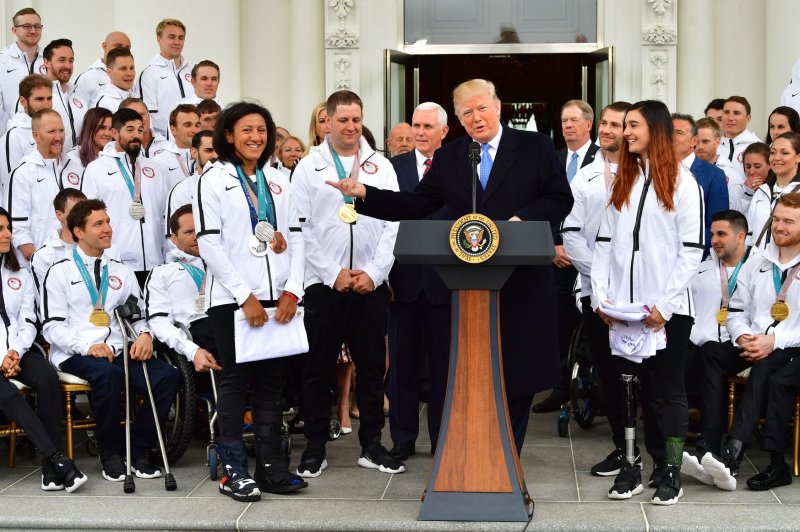1 of 2 | President Donald Trump meets members of the United State Olympic and Paralympic Teams at the White House on April 27. Photo by Kevin Dietsch/UPI |
License Photo
WASHINGTON, D.C. -- Most of the 244 athletes who competed in the Winter Olympics, even those winning medals, are unlikely to have careers related to sports. And because they have devoted so much time to training for the Games, they often struggle to establish themselves in different fields.
About 100 Team USA athletes who competed at the Pyeongchang Winter Olympics were honored by President Donald Trump at the White House last week. But first they attended a three-day Athletic Career and Education Summit in a Washington suburb to get help with launching careers after retirement from competitive sports.
"We help athletes get in touch with who they are beneath their athletic self. One workshop we have is 'becoming the CEO of your brand,' where we teach how to take your value system and use it to develop a brand," said Leslie Klein, director of ACE, which is funded by the U.S. Olympic Committee.
Only a handful of popular athletes from this year's Olympics, such as figure skater Adam Rippon or snowboarder Chloe Kim, are able to have careers based solely on personal brands developed at the Games. The majority of retired Olympians and Paralympians do not go into careers related to their sport, such as coaching, and instead are mostly interested in entrepreneurship, Klein said.
A USOC survey showed that 43 percent of athletes had trouble entering the workforce following their athletic career, and more than half were unsure what they would do after retiring from sports. As a result, ACE was created in 2014 to help athletes transition.
"The mindset and determination of doing whatever it took to get where you want...once they can get into a position and a job, those skills transfer really well," Klein said.
Since its first summit following the 2014 Sochi Olympics, 2,000 athletes have registered with the program. ACE has successfully helped 86 athletes from the 2018 Winter Games to advance professionally while performing for Team USA, Klein said.
"One of the things that was intriguing to me was they went over LinkedIn in-depth and kind of showed you the importance of that particular social media site and how to help network with different companies," Paralympian snowboarder Brittani Coury said.
Not only was Coury able to learn networking tools from ACE, but the program helped her enroll in the Chamberlain School of Nursing at DeVry University, a sponsor of the USOC that allows Team USA athletes to receive a tuition-free education.
Most athletes juggle part-time jobs or going to college with their training.
"A lot of the athletes whose names the general public might not have heard of, the sources of income include a direct athletes' program through the Olympic Committee that is very much tiered based on their performance, and each of the sport's governing bodies chooses how much they can support their athletes," Klein said.
But even as a silver medal-winning athlete, Coury said, she has no sponsors and works as a nurse while training.
"There's a certain level of toughness to have both as a nurse and as an athlete, and the transition I'm going through now is learning how to combine both," Coury said.
For Olympic speedskater Carlijn Schoutens, life since high school has been a constant tug-of-war between training and academics because she understands the short-lived career of a professional athlete.
"Every day I would usually get up a bit earlier, maybe around 6 a.m., and get on my bike for an hour or two, then I'd make my way to school, maybe make arrangements to miss the first hour of school. Once I was out of school, I would do my second workout for skating, then study and go to bed early," Schoutens said.
Schoutens has attended medical school in the Netherlands and is now a research assistant at
the University of Utah as she continues to train full-time for the next Winter Olympics.
The toughest challenge for most athletes is the psychological adjustment of moving from being the best in the world of sport to starting fresh in an unfamiliar field.
"It's a huge challenge...it's kind of scary and depressing for them," said Klein, who was an Olympic kayaker. "There's this sort of post-Olympic letdown because they're afraid that they won't be as passionate or rewarded for something in their life."















